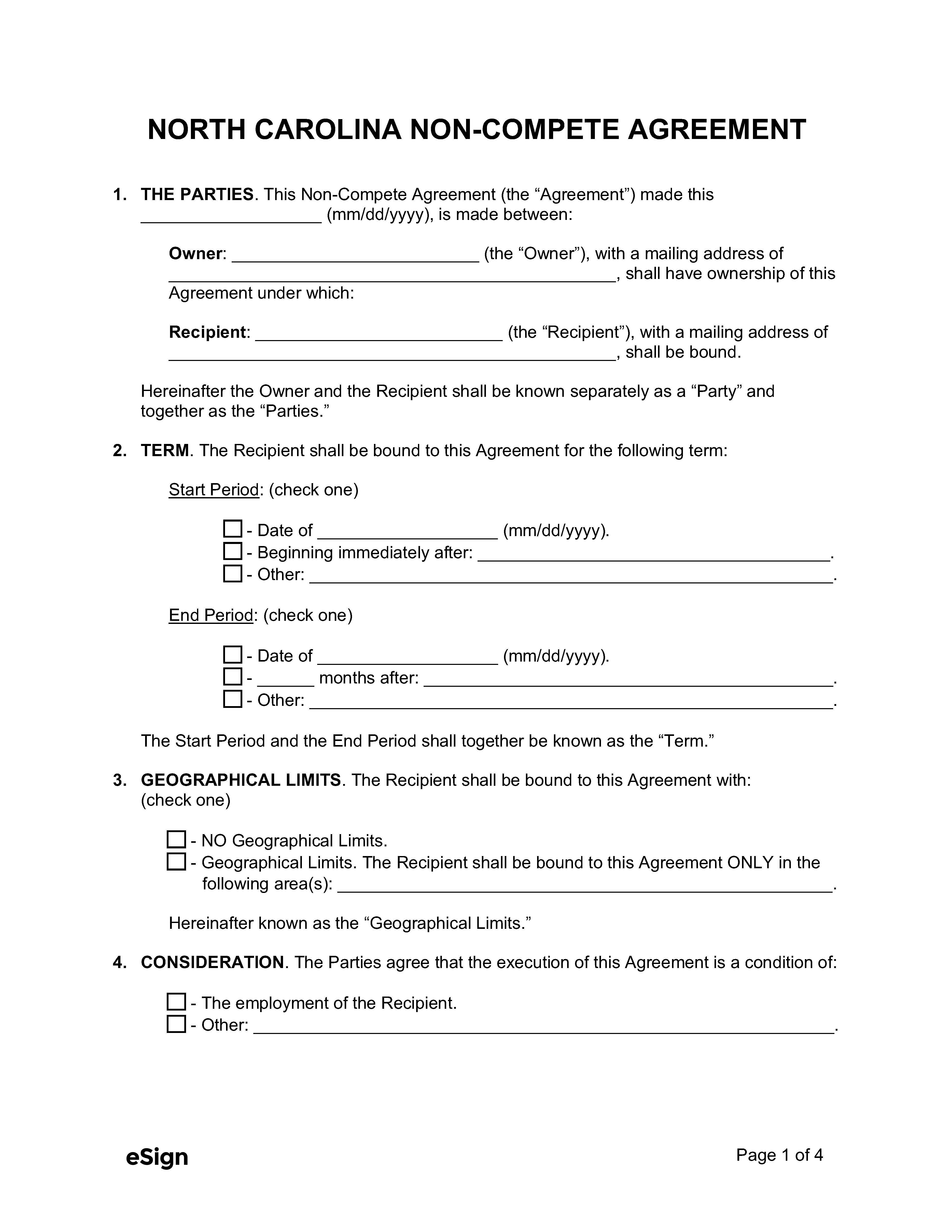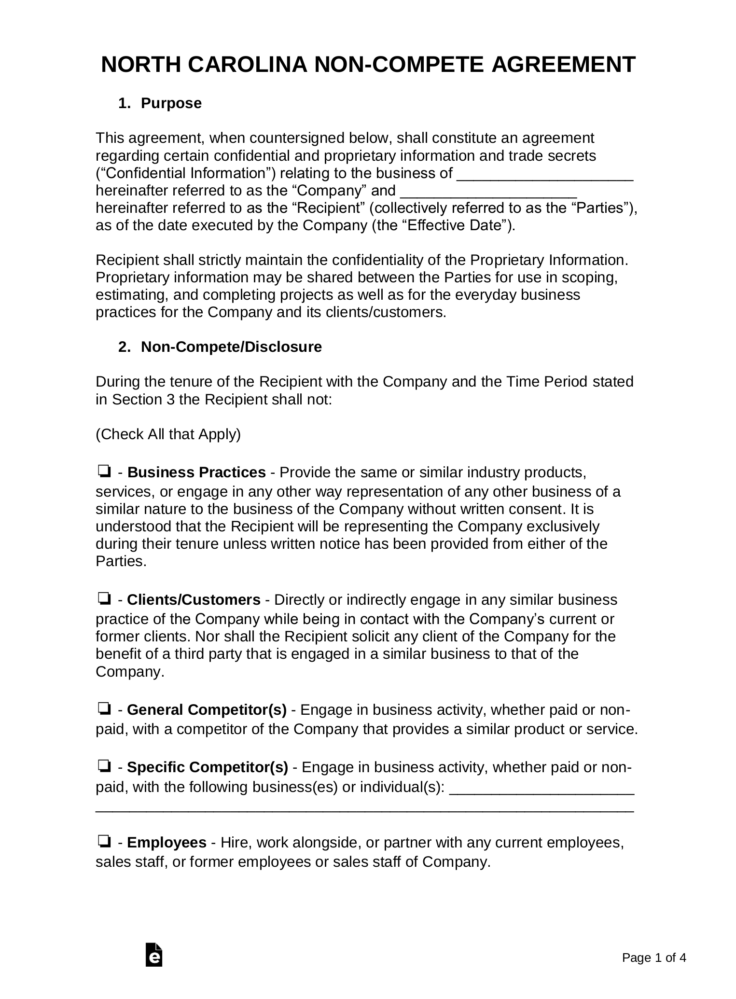Key Provisions of North Carolina Non-Compete Law
North Carolina non-compete law plays a crucial role in protecting business interests while balancing employee rights. Understanding this law is essential for employers and employees alike. It outlines when and how non-compete agreements can be enforced, aiming to prevent unfair competition. By learning the key provisions, you can navigate these legal waters more effectively.
Definition of Non-Compete Agreements

Non-compete agreements are legal contracts that restrict individuals from working in similar businesses or industries for a specific period after leaving a job. These agreements are designed to protect a company’s trade secrets, proprietary information, and customer relationships. Here are a few key points:
- Purpose: To safeguard business interests.
- Parties Involved: Typically between an employer and an employee.
- Scope: They can vary widely in terms of duration and geographic area.
In essence, a non-compete agreement ensures that employees do not take their skills and knowledge to direct competitors, which can harm their previous employer’s business. However, it’s essential to ensure that these agreements are reasonable and not overly restrictive.
Enforceability of Non-Compete Agreements in North Carolina
In North Carolina, non-compete agreements can be enforceable, but certain conditions must be met. Here are some key factors to consider:
- Reasonableness: The agreement must be reasonable in terms of time, geographic area, and scope of activities.
- Legitimate Business Interest: Employers must demonstrate a legitimate business interest that needs protection.
- Written Agreement: Non-compete agreements should always be in writing and signed by both parties.
The courts in North Carolina tend to uphold these agreements when they are clear, concise, and serve a valid purpose. If any of these conditions are not met, the agreement may be deemed unenforceable. Therefore, both employers and employees should carefully review these agreements before signing to ensure they understand their rights and obligations.
Key Elements Required for Enforceability
For a non-compete agreement to hold up in a North Carolina court, certain key elements must be present. These elements ensure that the agreement is not only fair but also serves a legitimate purpose. Here’s what you need to consider:
- Consideration: There must be something of value exchanged. For employees, this often means receiving a job offer, promotion, or additional training.
- Reasonableness: The terms must be reasonable. This includes the duration of the agreement, the geographic scope, and the nature of restricted activities.
- Legitimate Business Interests: The agreement must protect a legitimate business interest, such as trade secrets or customer relationships.
- Clarity: The language used in the agreement should be clear and unambiguous. Both parties should understand what is being restricted.
If these elements are not satisfied, the agreement may be challenged in court. Employers should draft these agreements with careful consideration to ensure they comply with North Carolina law. Consulting a legal professional can help navigate these complex requirements.
Duration and Geographic Scope Considerations
When drafting a non-compete agreement, two critical factors come into play: duration and geographic scope. Understanding these elements can make a big difference in whether the agreement is enforceable.
- Duration: The length of time a non-compete is enforceable can vary. In North Carolina, reasonable durations typically range from six months to two years. Longer durations may be scrutinized by the courts.
- Geographic Scope: This defines the area where the restrictions apply. A broader geographic scope may make the agreement harder to enforce. It’s essential to limit the scope to where the employer genuinely operates.
Ultimately, both the duration and geographic scope should be tailored to the business needs while ensuring they do not overly restrict the employee’s ability to find work. Employers should aim for a balance that protects their interests without being overly burdensome.
Exceptions to Non-Compete Agreements
While non-compete agreements are generally enforceable in North Carolina, there are exceptions where they may not apply. Understanding these exceptions is vital for both employers and employees:
- Public Policy: Agreements that restrict an employee’s right to work in their chosen profession may be deemed unenforceable.
- Unconscionability: If an agreement is overly harsh or one-sided, a court may refuse to enforce it.
- Employee’s Role: Non-compete agreements may not apply to certain roles, such as those that do not access confidential information or trade secrets.
- Termination Without Cause: If an employee is terminated without cause, the non-compete agreement may not be enforceable.
Knowing these exceptions can help employees understand their rights and can guide employers in drafting fair and reasonable agreements. Legal advice can provide clarity and ensure compliance with state laws.
Consequences of Violating Non-Compete Agreements
Violating a non-compete agreement in North Carolina can lead to serious consequences. Both employers and employees should understand what happens when these agreements are not honored. Here are some potential outcomes:
- Legal Action: Employers can sue employees who breach the agreement. This could result in costly legal fees for both parties.
- Injunctions: Courts may issue injunctions to prevent the violating party from continuing the restricted behavior, such as working for a competitor.
- Damages: If the court finds that a breach occurred, the employee may be liable for damages. This could include lost profits the employer incurred due to the violation.
- Reputation Damage: A breach of a non-compete can harm an individual’s professional reputation, making it harder to find future employment.
It’s crucial for employees to fully understand the terms of their non-compete agreements. Seeking legal advice can help clarify any ambiguities and minimize the risk of unintentional violations.
Frequently Asked Questions about North Carolina Non-Compete Law
Many people have questions about North Carolina’s non-compete laws. Here are some common inquiries:
- Are non-compete agreements enforceable in North Carolina? Yes, but they must meet specific legal requirements to be enforceable.
- How long do non-compete agreements last? Typically, reasonable durations range from six months to two years, but this can vary.
- Can I negotiate the terms of a non-compete? Yes, employees can negotiate terms before signing, so it’s worth discussing with your employer.
- What if I signed a non-compete and now want to leave my job? It’s important to review the agreement with a legal professional to understand your rights.
Understanding these questions can help both employers and employees navigate the complexities of non-compete agreements more effectively.
Conclusion on Understanding Non-Compete Agreements
Understanding North Carolina’s non-compete agreements is essential for both employers and employees. These agreements aim to protect legitimate business interests while also respecting an employee’s right to work. Key takeaways include:
- Ensure that non-compete agreements are reasonable in scope and duration.
- Recognize the legitimate business interests that these agreements aim to protect.
- Be aware of the consequences of violating these agreements.
- Consult with legal professionals when drafting or signing a non-compete agreement.
By being informed about these aspects, both parties can make better decisions that benefit their careers and business operations. Clear communication and legal clarity are key to navigating the complexities of non-compete agreements.


